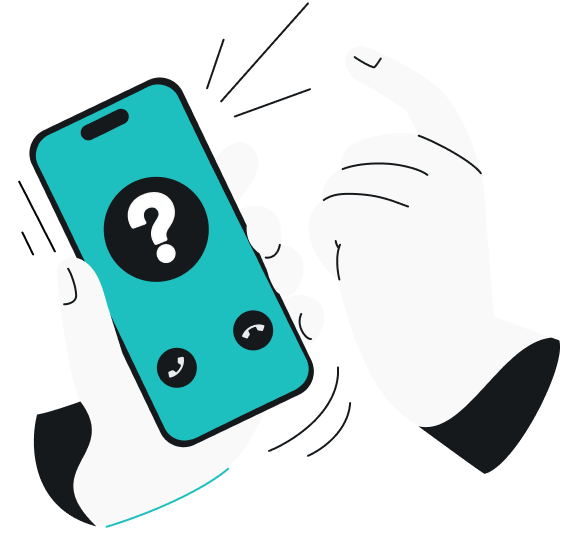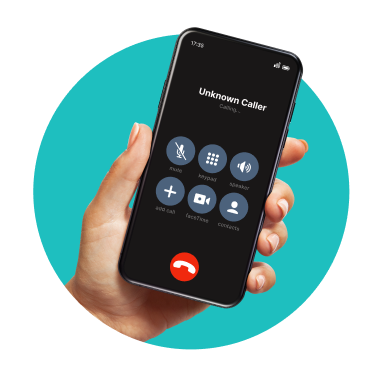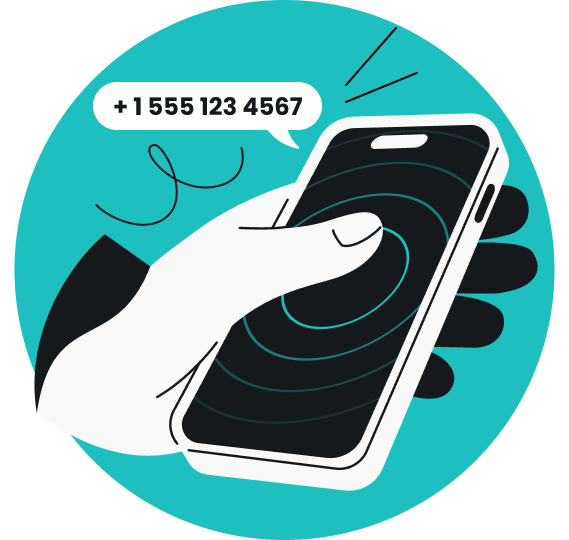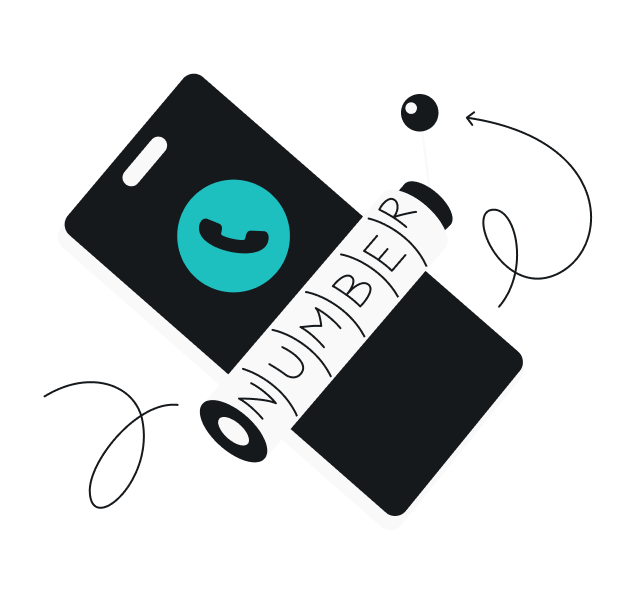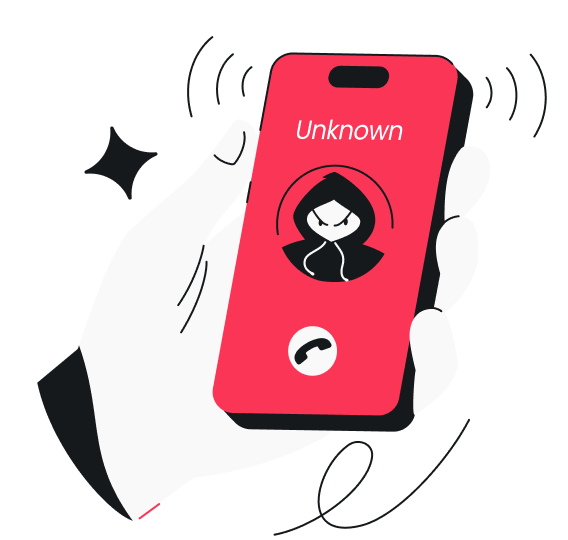This guide explores why random numbers may keep calling you and how to protect yourself from these disruptions.
Why are random numbers calling me?
Random numbers often call you because telemarketers and scammers use automated systems (like bots and autodialers) to call many numbers at once. When you answer, the system then connects to a live person. Unfortunately, answering these calls can flag your number as active, potentially leading to more unwanted calls and increased phone bill charges.
Recent advancements in modern technologies like VoIP (Voice over Internet Protocol) are making it much easier for unknown callers to contact you. Here’s a breakdown of the most common reasons behind random calls and their impacts:
- Telemarketing and sales calls: companies sometimes use telemarketing and sales calls to aggressively promote their products or services. These calls can be frustrating when they interrupt your day, but they are legal as long as companies follow regulations. The same can be said about annoying calls from research companies like Dynata;
- Scam and fraudulent calls: some random callers pretend to be from legitimate organizations like banks or government agencies. However, they may try to get your personal information, such as your Social Security Number (SSN) or bank details;
- Caller ID spoofing: scammers can display fake local numbers that look like they’re from someone you know or a legitimate organization. In doing so, they make you more likely to actually answer their calls;
- Your number was added to a call list: if you subscribed to a service or shared your phone number with a business, your number could have been sold to a marketing company;
- Automated robocalls: these are pre-recorded messages and can be important reminders from your doctor or alerts from your bank. But sometimes, they can be spam or tricksters trying to gain your personal information;
- Wrong numbers: sometimes, you harmlessly get a call from an unknown number only because someone dialed your number by mistake.
Should I answer an unknown call?
Everybody has their own opinion about whether to answer a random call. Some people prefer never to pick random calls at all, while others think it’s fair enough to answer the phone since it could be important.
So, let’s evaluate the potential risks of answering calls from unknown numbers and decide whether it’s worth picking up.
Exposure to scams or phishing attempts
When you pick up a call from an unknown number, the caller can trick you into giving personal information or money. They usually pretend to be from a reputable company or government agency and create a sense of urgency to pressure you into sharing sensitive data.
If you answer this type of call, they will know your number is active and keep calling you. They can even call you from different numbers if you put them in your block list. That’s why it’s safer to let these calls go to voicemail so you can decide later if they are worth returning.
Unwanted sales pitches
Unknown numbers are sometimes linked to telemarketing calls, too. Telemarketers use these calls to sell products or services you likely don’t need. Answering these calls can open the floodgates to unwanted calls, as your number will probably be shared or sold to other telemarketing lists.
Potential for identity theft
Fraud companies can also call you to gather personal details like your name and address or even record your voice. They can then use this information for identity theft and commit fraud in your name. To protect yourself, it’s best to be cautious when answering unknown calls and avoid sharing personal information unless you know the caller’s identity.
Privacy concerns
When you receive a call from an unknown number, you may mistakenly share personal information that could be used against you. Beyond your name and address, other sensitive details, such as your date of birth (DoB), SSN, or even your voice, can be exploited by scammers for identity theft or fraud.
Scammers can even spoof numbers to appear local or familiar, tricking you into answering. So, be aware of what information you share over the phone, especially with unknown callers, to prevent them from misusing your private information.
What to do if you have already answered the call
Even if you know the risks, you can still accidentally pick up a call from an unknown number — this can happen to anyone. But instead of worrying, follow these actionable steps to prevent any potential damage.
- Stay calm and ask the caller who they are and what they want to discuss.
- Don’t say anything at first — wait for them to speak so you can identify whether it’s someone you know or a stranger.
- If you’re unsure about the caller’s identity, ask them a couple of questions.
- If the caller sounds suspicious or asks for personal information like your SSN, pin code, or national ID — hang up immediately.
- If you suspect a scam or threat, report the incident to local authorities so they can take the proper actions.
- If you unintentionally share sensitive information, such as an OTP (One-time Password) or credit card number, contact your bank immediately to secure your accounts or block your credit/debit cards.
- After the call, block the number to prevent them from calling you in the future.
How to stop getting calls from unknown numbers
Receiving frequent calls from unknown numbers can interrupt your day, break your focus, and create unnecessary stress. Here are a few effective ways to help stop getting these:
1. Use an alternative number
Alternative numbers help prevent unwanted calls by keeping your regular number private during online registrations and public listings.
Surfshark’s alternative number feature provides a virtual phone number for sign-ups on untrusted websites. This keeps your primary number private, protecting it from telemarketers and spammers who rely on such information to contact you.
Alternative number is a paid add-on to Alternative ID, a Surfshark product included in all subscription plans. Alternative ID generates identity credentials and alternative email addresses, which you can use for registrations where you prefer not to share your personal information.
2. Use call-blocking features
If random calls do not stop, you can block unknown callers regardless of your device. Here’s how:
To block unknown numbers on an iPhone:
- Open Settings on your iPhone.
- Scroll down and tap Phone.
- Tap Silence Unknown Callers.
- Toggle the switch to on.
This will send calls from unknown numbers directly to voicemail without ringing your phone.
To block unknown numbers on an Android:
- Open the Phone or Call app on your Android mobile.
- Tap on the three-dot menu, usually available in the upper-right corner.
- Select Settings, then go to Block numbers.
- Turn on the Block unknown callers option to prevent unknown numbers from reaching you.
Some Android devices can have slightly different settings, but the general process remains the same.
3. Utilize call screening apps
Another easy way to get rid of unwanted calls is to use call screening apps that can automatically identify and block unknown callers. Here are some of the best apps you can use for this purpose:
- Truecaller has a massive database of spam numbers and uses this to identify and block calls from telemarketers and other unwanted callers. It also provides caller ID so you can see who’s calling even if they’re not in your contact list;
- RoboKiller blocks random unknown calls using its spam detection algorithm and answers them with humorous or frustrating pre-recorded messages. This feature wastes the scammers’ time, so they refrain from making future calls;
- Call Control provides advanced spam call-blocking features using community-reported data and user-defined block lists. It also has a Do Not Disturb mode to block all calls except those from contacts or VIPs (people you have added as trusted or important contacts like family members);
4. Register with Do Not Call lists
National and regional Do Not Call (DNC) lists are regulatory measures governments take to protect consumers from random telemarketing calls. These lists allow people to register their phone numbers by specifying that they do not want to receive business marketing calls.
Once a number is on the list, telemarketers are legally required to avoid calling it. Otherwise, they could face fines or penalties. So, registering your number in your region’s DNC list is another easy way to stop getting random calls. To do so, follow these steps:
- Search Google for your country’s DNC list website. For example, the DNC list link for the national US registry is donotcall.gov.
- Click on Register Your Phone and follow the prompts.
- Add your phone number and email address.
- After submitting your information, you’ll receive a confirmation email.
- Click the link in the email to complete your registration.
Your number will be added to the registry within 24 hours, but it can take up to 31 days for sales calls to stop.
5. Avoid sharing your number publicly
Here are some of the best ways to keep your phone number private and avoid exposure:
- Use an alternative number: use a secondary number or a virtual number for subscriptions or other non-essential services;
- Avoid sharing on social media: don’t post your phone number publicly on social media profiles or in posts, comments, or bios;
- Use app-based authenticators: instead of SMS-based two-factor authentication (2FA), choose app-based authenticators to avoid exposing your number;
- Use privacy settings: check the privacy settings of apps to ensure your number isn’t being shared with third parties or displayed publicly;
- Opt-out of public directories: remove your number from public directories to avoid uninvited calls;
Use messaging encryption: instead of SMS, use messaging apps that give end-to-end encryption to communicate with friends and family; - Review permissions regularly: periodically check and adjust the permissions of apps on your phone to limit their access to your contacts and personal data;
- Monitor data leaks: stay informed about data breaches and take action if a hacker gets your information;
6. Remove your number from data broker lists
With Incogni, you can remove your phone number and other personal data from data broker lists. Surfshark offers this unique product, which contacts data brokers on your behalf and requests that they delete your personal information from their databases.
This can save you a lot of time that would otherwise be spent dealing with individual data removal requests.
Note: Currently, Incogni is only available in the United States and Europe. If you’re in one of these parts of the world, you can access Incogni as part of the Surfshark One+ package and get extra privacy from unwanted calls or spammers.
Say goodbye to annoying random calls
Now that you know why random numbers call you, it’s time to protect your phone number from fraudsters and random calls. A great way to do so is by taking general precautions and using an alternate phone number — like Surfshark’s Alternative Number, which allows you to mask your real number from spam and scammers.
FAQ
Why am I getting calls from random numbers saying I called them?
If you’re receiving calls from people claiming you called them when you didn’t, it’s likely due to caller ID spoofing. Fraudsters use this technique to disguise their number as someone else’s. So, the recipient sees your number on their caller ID and returns the call, believing it’s legitimate.
Why do random numbers call me on WhatsApp?
WhatsApp is a popular platform, and scammers exploit its global reach to send unsolicited messages or calls. Random numbers can contact you there for various reasons, such as spam, phishing attempts, or simply wrong numbers.
Why do random numbers call me from different countries?
Random calls from different countries are usually part of international fraud operations. These calls can be part of a one-ring scam, where the scammer hopes you’ll call back and get expensive international charges.
To stop receiving calls from unknown international numbers, you can either block them once you receive an international call or ask your mobile carrier to block international calls.
What is spoofing a call?
Call spoofing is a technique tricksters and telemarketers use to misrepresent the number that appears on your caller ID. Instead of displaying the actual number they’re calling from, they can make it look like the call is from a local or familiar number so that you’ll answer.
Why do I keep getting calls from random numbers in my area?
You can get calls from random numbers in your area due to neighbor spoofing. Scammers use this technique to mimic a number from your area code and trick you into thinking the call is from someone nearby, like a neighbor or a local business.

